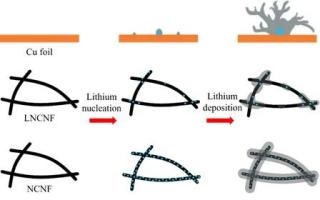Jun 21 2018
Quan-Hong Yang from Tianjin University and Wei Lv from Graduate School at Shenzhen, Tsinghua University, have worked with their colleagues to develop a current collector, which is a lightweight, high nitrogen-doping level carbon nanofiber framework, for lithium metal anodes. The framework can restrict the growth of dendrite and enable a uniform deposition of lithium. The study has been recently reported in Science China Materials.
 This is a schematic diagram of lithium nucleation and deposition behavior on Cu foil, low nitrogen-doping level carbon nanofiber framework and high nitrogen-doping level carbon nanofiber framework. (Image credit: Science China Press)
This is a schematic diagram of lithium nucleation and deposition behavior on Cu foil, low nitrogen-doping level carbon nanofiber framework and high nitrogen-doping level carbon nanofiber framework. (Image credit: Science China Press)
Yang’s team and Lv’s team will continue their research on carbon materials and their applications in energy storage.
They stated that “despite the high-energy-density of lithium metal batteries, the intractable dendrite growth resulted in low coulombic efficiency, internal short circuit and even hazardous issues hinder their practical use. Carbon materials can play a significant part in solving above-mentioned problems, enabling the practical application of lithium metal anodes.”
Immense efforts have gone in to overcome the problem of lithium dendrite growth. The conductive three-dimensional framework structures, such as the 3D graphene framework and the porous Cu current collector, have gained higher attention due to their ability to lower local current density and make way for large changes in volume during cycling.
Despite the excellent structure stability and superior electrical conductivity, the porous metal current collector is heavy, greatly comprising the energy density, the porous carbon framework is lightweight, which benefits to improve the energy density based on the whole device. Yet their non-lithiophilic surfaces are not ideal for the uniform nucleation and deposition of lithium.
Quan-Hong Yang
It is possible for nitrogen-containing functional groups on the surface of the carbon framework to interact with lithium atoms and improve the lithiophilicity of the carbon framework. Polyacrylonitride can be used as the raw material to easily produce a lightweight and high nitrogen-doping 3D conductive carbon nanofiber matrix (NCNF) through electrospinning, pre-oxidation, and thermal treatment.
According to Yang, when NCNF is used as the current collector, it can provide various benefits:
- A lightweight matrix has the ability to maintain the high specific capacity of Li metal anode. The NCNF’s density is only 0.57 mg/cm2. When the lithium loading is 4 mAh/cm2, the lightweight NCNF provides a large capacity of 2489.7 mAh/g based on NCNF-Li composite.
- High specific surface area and 3D structure play a vital role in decreasing the local current density and making room for the large volume changes during cycling.
- High nitrogen-doping ensures adequate low nucleation overpotential sites on the large surface of the NCNF, leading to uniform lithium nucleation and inhibiting lithium dendrite growth.
These led to exceptional cycling stability with a high coulombic efficiency that is 98% more than 250 cycles for lithium deposition. In addition, when Li@NCNF anode was coupled with LiFePO4 to construct full cell, high capacity retention and reduced voltage polarization were demonstrated.
Yang concluded, “this work clearly demonstrated the important roles of the heteroatom doping for the modification of carbon surface to realize the uniform and dendrite free metal anode deposition, and also showed great potential of light weight NCNF for the use in metal-based anodes with high energy density.”
The Guangdong Natural Science Funds for Distinguished Young Scholar, National Natural Science Foundation of China, the Key Basic Research Program of China, and the Shenzhen Technical Plan Project funded the study.